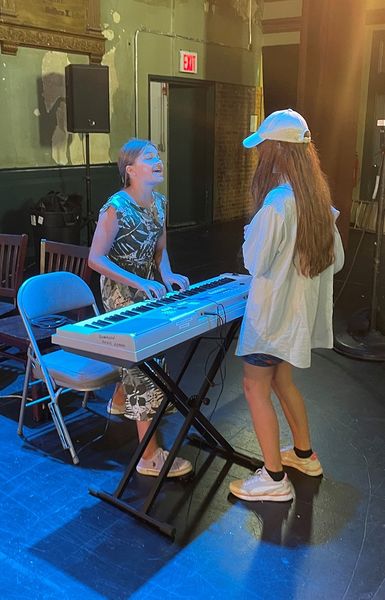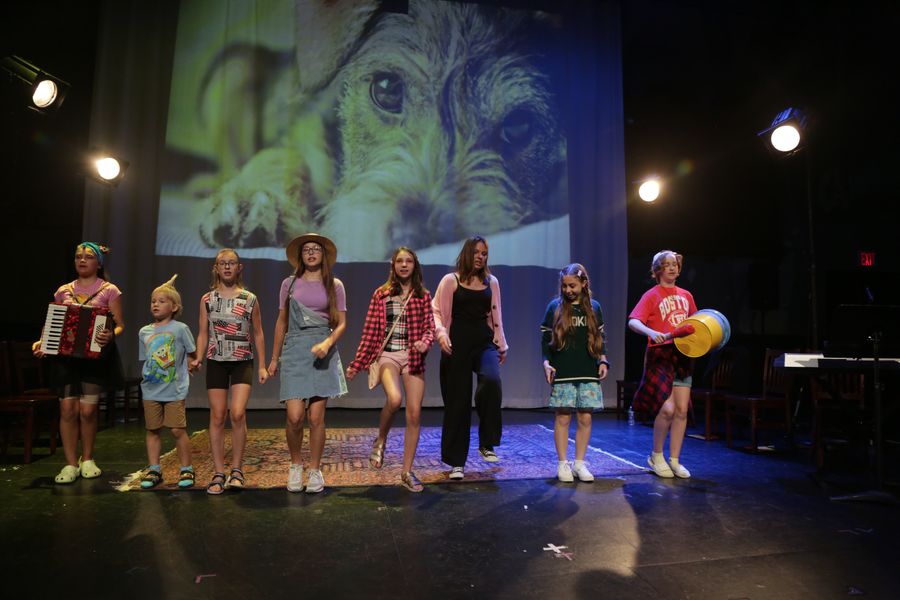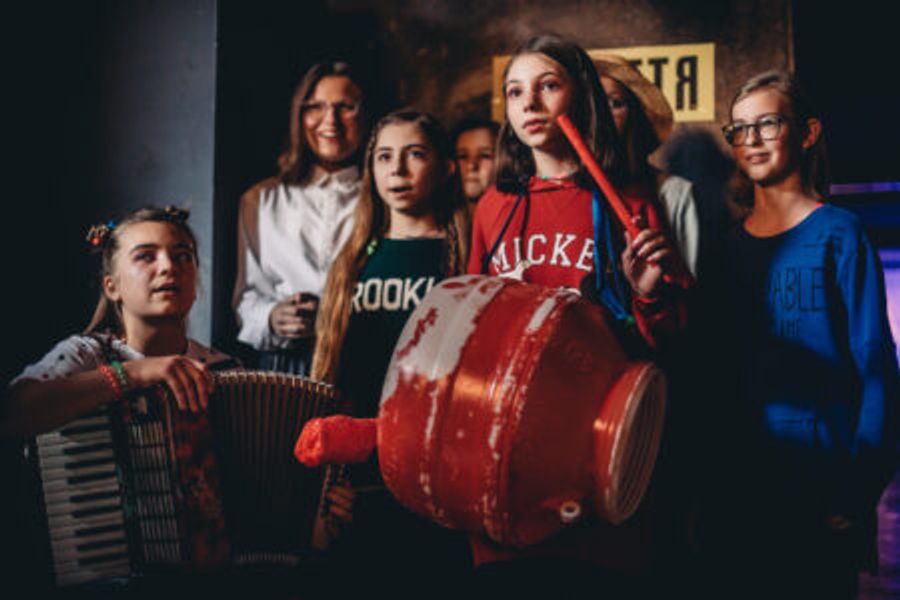Last week at Brooklyn’s Irondale, in a cavernous auditorium that was once a Presbyterian Sunday school building, a group of girls and a few adults ran through tech rehearsal for a show called Mom on Skype, in preparation for a limited run over the weekend, Aug. 13-14. The girls acted like typical tweens and teens in a punchy mid-afternoon slump at theatre camp: They lolled and flitted about the space, chatting and laughing, occasionally breaking into spontaneous song—including a spirited rendition of the viral hit “Numa Numa” (“Ma-ia hii! Ma-ia huu!”).
If you listened for even a second, of course, you’d hear that they were mostly speaking Ukrainian, plus a bit of English via translation to communicate with Irondale tech director Max Cerci, executive director Terry Greiss, and executive assistant Jacqueline Joncas. This wasn’t just any visiting troupe from Europe: These seven girls and one boy, aged 7-14, from Lviv, Ukraine, had been flown in at considerable expense and effort by Irondale and its supporters to perform their play as a gesture of solidarity with the Ukrainian people currently under Russian siege.
Putting human faces on the headlines, and creating a bridge in the way only live performance can, were among Irondale’s goals in raising the considerable money and donations that made the girls’ visit possible. Greiss told me that Irondale artistic director Jim Niesen sent him a link to a New York Times piece about the show’s performance in a Ukrainian bomb shelter, with the note, “This will inspire you.”

“I wrote back and said, This is exactly what we’ve been talking about for the past 40 years—that theatre is not just entertainment, it’s of tremendous importance to the cultural life of the community. It can be as necessary as the water supply and clean air, all the things we know we can’t do without. And I had this harebrained idea: Why don’t we bring them over here? I had no idea what that would take.”
It took just a few Zoom calls with Oleg Oneshchak, the Ukrainian soldier who had directed the original play, to get the idea rolling. But then came several weeks of fundraising and intense lobbying. As Casablanca might remind us, getting visas out of a warzone is no easy task; Greiss said the wait time just for an appointment can currently be as long as three years. But with the help of Brooklyn Congressman Hakeem Jeffries and Sen. Chuck Schumer, the visa process was fast-tracked to just three months. The girls couldn’t fly directly out of Ukraine, but if they and their chaperones could make it to Poland, visas and flights could be arranged. And to foreclose the possibility that any might be tempted to overstay these visas, each was required to leave behind the name of a loved one in Ukraine.
There seemed little danger that the girls I spoke to last week would want to linger. Though they were enamored of many things about the U.S.—they’d seen and loved The Lion King the day before, and the Statue of Liberty that morning—all said they were homesick. That resonates with the theme of Mom on Skype, which is not about the war but about a bittersweet period in the post-Soviet years when many Ukrainians suddenly had the freedom to travel, and many used it to take jobs abroad and send money home to their families. The play dramatizes the title quandary: having a connection to their loved ones only via technology.
This, of course, resonates with the plight of many Ukrainians now separated from each other within their own country, by circumstances ranging from death and imprisonment to basic logistical hurdles created by the Russian siege, not to mention those separated by travel or escape, even briefly, like the Mom on Skype troupe. Indeed, military duties prevented the play’s director, Oleg Oneshchak, from making the trip, but at one point during rehearsal, he appeared via Facetime on a phone held by his wife, Maria Oneshchak, who was able to travel. He seemed to be conveying some notes about the show, which Maria then passed onto the girls.
Though Mom on Skype features a number of Ukrainian folk songs, with the accompaniment of Oleg’s daughter, Hanna, on accordion, the show has an impassioned epilogue, as Hanna moves to a standing keyboard and sings a soulful plea for peace, mostly in English, that she told me she started writing not long after the Russians invaded Ukraine. The chorus goes, “We are one family, so we would prefer the country to be free,” with Hanna stretching the last word into two syllables upward across an octave.
“We are all crying when she plays that,” said 14-year-old Anastasiia Mysiuha.
Greiss told me that the weekend’s two performances drew a total of roughly 250 audience members, including a number of Ukrainian Americans, and raised around $4,000, all of which will be donated to Ukraine. An initial press release had paraphrased Oleg Oneshchak as saying he hoped “to raise money to buy a fighter jet for their military so they can keep their sky safe.” Greiss admitted that $4,000 probably wouldn’t cover a fighter jet, but it “would pay for many first aid kits.”

Like many of us, Greiss has lived long enough to see relations between Russia and the West go through many ups and downs—mostly downs. Irondale, he pointed out, had traveled to perform in Russia a number of times over the years, and he asked staff members to cover or put away the posters commemorating those trips when the Ukrainians were around.
“These girls are very anti-Russian, as you might imagine,” he told me, noting that they were “livid” after a visit to the Guggenheim Museum, where the work of Kandinsky is prominently featured. (Never mind that Kandinsky spent most of his career in Germany and France, and was pointedly unbeloved in Soviet Russia in his lifetime.) He said he asked one of the adults if they make a distinction between Putin and the Russian people, and he was told, “They used to, but now that so many are brainwashed, so that 89 percent of Russians support the war, they don’t make that distinction.”
Politics aside, it was the heroism of making theatre in adverse circumstances that drew Greiss and Irondale to this quixotic venture.
“Making a play is hard anyway, and making a play with children is even harder, like herding cats,” Greiss said. “If I had to make a play with children while bombs were dropping outside my window, would I do it? I’d like to think I would, but I’m not sure. But they did it, and that was heroic in my eyes. I said, ‘It doesn’t matter what this costs, we have to do this.’”
I asked the girls about their experiences in the war. With a few notable exceptions, the western Ukrainian city of Lviv has mostly been spared direct Russian attacks, and none of the folks I spoke to had lost immediate family members in the fighting. But all had spent some fearful, chilly hours in bomb shelters; indeed, the original production of Mom on Skype was performed in a bomb shelter, which Valeriia Khozhempa, a 12-year-old, recalled as “so cold, so hard, but we do it.”
“We had a beautiful life, but Russians broke it,” Valeriia told me. “Russia is like a zombie, they can just kill and kill.” When I asked the girls if they were nervous about performing their play for American audiences, clear-eyed Hanna said to me without skipping a beat: “No, I’m nervous about the war.”
Rob Weinert-Kendt (he/him) is the editor-in-chief of American Theatre. rwkendt@tcg.org


